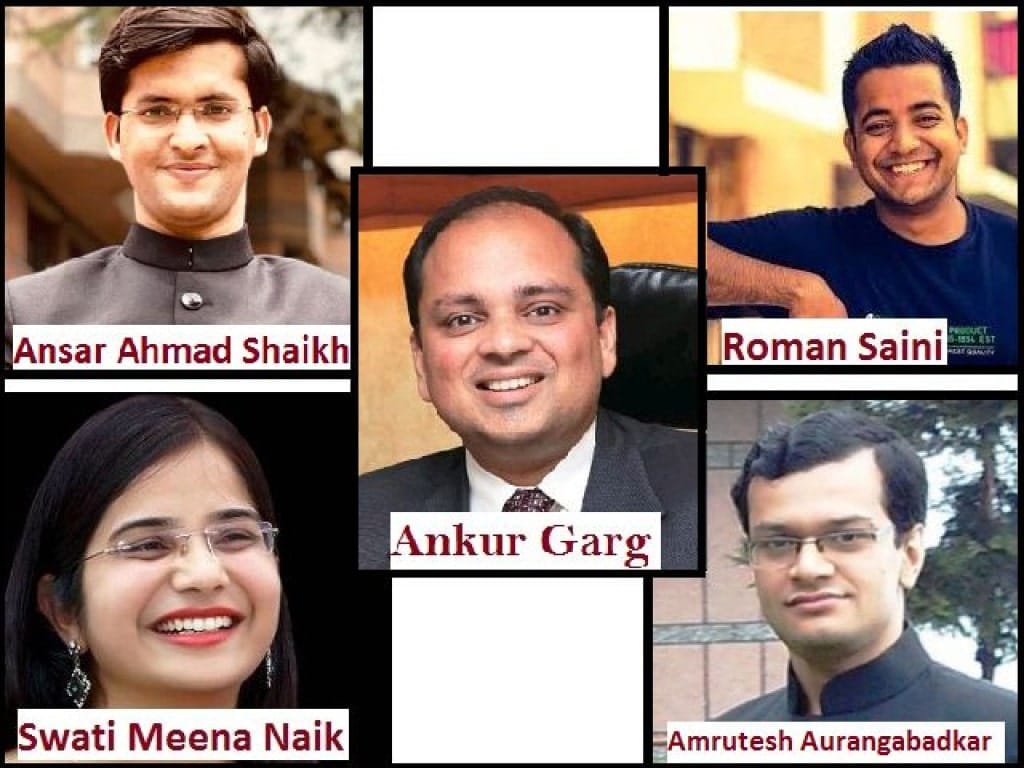How to Become an IAS Officer – Eligibility, Exam
11 min read
How to become an IAS officer is a question mark to many? Millions of Indians have a dream of becoming aspiring IAS officers. There is no doubt that IAS is one of the most prestigious and white-collar services in India.
In short, you need to work very hard with dedication to become an IAS officer. Not only dedicated efforts but also smart work count. For smart work, you have to follow some guidelines.
Who is an IAS
IAS is one of the most inspiring careers for millions of Indians. Many want to become an IAS officer and have a stepping stone to success in their career. An IAS officer’s ultimate aim is to serve the country.
IAS officer can be in any of the government servant roles like
- Chief Secretary
- Cabinet Secretary
- Commissioner
- Joint Collector
- Chief Development Officer
- Member Board of Revenue
- Chairman Board Of Revenue
- Divisional Commissioner
- Sub Divisional Officer
- District Magistrate
- Deputy Commissioner
Full form of IAS
Formerly, IAS was known as ICS which stands for Imperial Civil Service. IAS stands for Indian Administrative Service. To become an IAS officer one needs to crack Civil Services Exam(CSE) conducted by the Union Public Service Commission(UPSC).IAS is one of the parts of All India Services. It is one of the prestigious government services amongst 24 services in India.
IAS is one of the most inspiring careers for millions of Indians. To convert your dream into reality and become a successful IAS officer you need to follow guiding steps. The Eligibility Criteria, Age Limit, Syllabus, and Preparation are as follows.
How to become an IAS Officer
To become an IAS officer you need to crack the UPSC-CSE exam. The exam is conducted with the aim to recruit government officials of a total of 25 services in India. IAS includes All India Services comprising of IAS, IPS, and IFS.

Eligibility Criteria
The eligibility criteria like age criteria, educational qualification, number of attempts for a candidate to become an IAS Officer are as follows.
Age Limit
The minimum age to appear for UPSC- Civil Service Exam is at least 21 years. The age limit to become an IAS officer for the general category is 32 years for OBC is 35 years and SC/ST is 37 years respectively.
And maximum age limit as of 1st August 2020 is as follows.
| Category | Age Limit |
| General Category | 32 Years |
| OBC | 35 Years |
| SC/ST | 37 Years |
| Defense Service Personnel | 35 Years |
| Ex-Servicemen | 37 Years |
| Handicapped Person | 42 Years |
| ECO’s/SSCO’s who have been in Military Service for 5 years |
37 Years |
Educational Qualification
- The basic qualification to appear for the IAS exam is graduation in any of the fields.
- A candidate to appear for the UPSC-CSE exam should hold a degree from a recognized University.
- Even the final year graduation students can apply for this examination.
- The procedure is same for the students from science branch.
- Even those candidates who have completed their education from distance education or through a correspondence education are eligible to apply for a post of IAS officer.
- Candidates awaiting the results are also eligible for the Prelims Exam of the UPSC-CSE Exam. But for Mains Exam they have to produce proof of passing the exam.
- Candidates with technical degrees are also eligible to apply for this post.
- Also, a candidate with a professional qualification can apply for the exam.
- A Medical student who has completed the degree but is undergoing an internship program is also eligible to apply for the post.
- Candidates who have passed the ICAI, CWA, or ICSI Exam.
Number Of Attempts
The number of attempts to become an IAS Officer and for UPSC is as follows.
| Category | Number of Attempts |
| General Category | 6 Attempts |
| OBC | 9 Attempts |
| SC/ST | No limit till 37 years |
For Handicapped
| Category | Number of Attempts |
| General Category | 9 Attempts |
| OBC | 9 Attempts |
| SC/ST | No Limit |
Number Of Vacancies
Approximately the total number of vacancies for IAS is 796. Out of these 796 vacancies, 24 vacancies are for a reserved class. And, approximately 39 vacancies are for disabled persons.
The number of vacancies reserved for IAS.
| Number Vacancies | Out of 796 |
| Reserved Vacancies | 24 |
| Blind Person | 3 |
| Deaf Person | 9 |
| Disable person | 8 |
| Multiple Disabilities | 4 |
How to fill IAS Exam Form
The procedure to fill IAS Exam Form is as follows.
Step 1. Visit the official website of UPSC – www.upsc.gov.in
Step 2. Now, click on the online application for various examinations
Step 3. Go to service civil services examination-Preliminary Exam
Step 4. Start registering with IAS Part-1
Step 5. Fill in all your mandatory Personal Details
Step 6. Choose the examination center
Step 7. Upload your passport size Photograph, Signature, and Identity card
Step 8. Accept the Declaration by clicking on the button
Step 9. Once recheck the details
Step 10. Then click on Submit button
Step 11. Keep this printout with you
IAS Exam Syllabus & Pattern
To become an IAS officer a person needs to crack the Civil Service Examination (CSE) which is conducted by Union Public Service Commission (UPSC). It is one of the toughest competitive exams in India. Approximately every year 1000 candidates are selected as IAS Officers.
What is UPSC
UPSC is a National Level Exam. UPSC stands for Union Service Public Commission which is a central agency that conducts IAS Exam (Indian Administrative Service).
UPSC is also known as Civil Services Examination which is conducted by UPSC. Also, it is a pen-paper type. The total number of attempts a person is liable to give are attempts of 6 attempts. UPSC is an All India Exam to become DM, IFS, IAS, IPS, SDM & Collector.
Online Application for the exam starts from February to March tentatively. Generally, UPSC conducts an exam once a year generally in the month of October. The result of the exam is declared in the month of November.
UPSC Exam Overview
| Exam | UPSC -CSE Exam |
| Authorized Body | Union Public Service Commission |
| Level | National |
| Exam Stages | 1. Preliminary 2. Mains 3. Interview |
| Eligibility Criteria | Nationality – Indian Age Limit – Between 21 to 32 years ( General Category) Age limit for OBC – 35 Years Age limit for ST/ST – 37 Years Educational Qualification – The candidate must have completed graduation in any field. |
| Number of Attempts | 6 Attempts (General Category) For OBC – 9 ST/SC – No limit |
UPSC – CSE is conducted in three stages listed below.
- Preliminary exam
- Mains exam
- Interview process
Let us understand all the 3 exams more in detail.
1. Preliminary Exam
The preliminary exam has 2 papers that are conducted. Each paper has 200 marks a total of 400 marks. The question paper is in two languages namely English and Hindi. The duration of the paper is 2 hours each paper. This examination carries a negative marking of the one-third penalty. That is for each wrong answer there is a negative marking of 0.33 marks. This paper has objective-type questions which comprise multiple-choice questions.
The Preliminary exam consists of two papers – Paper 1 & Paper 2. The details of both papers are listed below.
Preliminary Exam Details
| Paper | Type | Number of Questions |
Marks | Negative Marking |
Duration |
| Paper 1 | Objective | 100 | 200 | 0.33 | 2 hours |
| Paper 2 | Objective | 80 | 200 | 0.33 | 2 hours |
Syllabus for the Preliminary Exam
Paper 1. Current affairs
Here, you need to have very good general knowledge and good general studies of current events going on at the National and international levels. You need to read newspapers to gain general knowledge.
Paper 2. Civil Service Aptitude Test (CSAT)
This paper comprises competencies related to comprehension, interpersonal, and communication skills. Hereby analytical ability, logical reasoning, and mental ability are also tested. Also, there are questions related to decision-making and problem-solving.
The syllabus for both the papers of the Preliminary exam is listed below.
| Paper 1 | Indian History General Science Indian Politics Current Events General Issues Indian Geography World Geography Social Development Economic Development |
| Paper 2 | Communicational Skills Intrapersonal Skills English Skills English Comprehension Language skill that is chosen by the candidate Decision-making skills Problem-solving ability Mental Ability Basic Numeracy |
2. Mains Exam
After qualifying for the preliminary exam the candidates are eligible for the second round that is the mains exam. Generally, Mains Exams are conducted in the month of January. After the mains exam, the candidate will be liable for the process of the interview. Mains Exam has the descriptive type of questions.
The Mains exam includes a total of 9 papers that are listed below. More details are given below.
Syllabus for Mains Exam
The total marks for this examination are 1750 marks. Though the Mains exam consists of 9 papers, out of these 9 papers, only 7 papers will be taken for the merit ranking. For the remaining two papers the candidate should obtain the minimum marks as set by UPSC. This exam includes a total of 9 papers as follows.
| Paper | Syllabus | Marks | Duration |
| Essay | Essay on any topic | 250 | 3 hours |
| General studies 1 | Indian Heritage, Culture, Geography |
250 | 3 hours |
| General studies 2 | Constitution, Governance, Social Justice |
250 | 3 hours |
| General studies 3 | Technology, Environment, Disaster Management |
250 | 3 hours |
| General studies 4 | Ethics, Integrity, and Aptitude |
250 | 3 hours |
| Optional subject 1 | Any | 250 | 3 hours |
| Optional subject 2 | Any | 250 | 3 hours |
| Paper 1 | Indian Language (Anyone of the language) |
300 | 3 hours |
| Paper 2 | English language | 300 | 3 hours |
Essay
To write an essay on any one topic. You can choose the option of your choice from the given options.
General Studies 1 – Indian Heritage & Culture
- Indian Culture
- Modern Indian History
- History of the world
- Society
- Geography
- Events, Forms, and Effects on Society
General Studies 2 – Indian Constitution & Indian Politics
- The Constitution Of India
- Amendment Procedure
- The Political System
- Central Government And Administration
- The Electoral Process
- Administrative Law
- Central And State Government Privileges
- Public Services
- Social Welfare And Social Legislation
- Control over Public Expenditure
General Studies 2 – Science & Technology
- Energy
- Computer and Information Technology
- Biotechnology
- Disaster Management
- Nuclear Policy Of India
- Space Technology
- Environment
- Security
- Agriculture
- Economy
General Studies 3 – Ethics & Human Interface
- Ethics and Human Interface
- Aptitude
- Attitude
- Integrity
- Emotional Intelligence
- Public Service Values And Ethics in Public Administration
- Probity in Governance
Optional Subjects
There are 2 Papers on Optional Subjects. The candidate is supposed to choose any 1 optional subject out of 48 total options. The 2 papers are combined and are of a total of 500 marks. You need to be very careful while choosing your optional subject. You must know which optional subject will work best for you.
The candidates can choose their Optional Paper 1 & Paper 2 from the subjects listed below.
- Law
- Physics
- Statistics
- Philosophy
- Zoology
- Sociology
- Public Administration
- Political Science
- Medical Science
- Management
- Mechanical Engineering
- Civil Engineering
- Electrical Engineering
- Economics
- History
- Geography
- Mathematics
- Geology
- Commerce
- Agriculture
- Animal Husbandry
- Chemistry
- Botany
- Anthropology
English & Language Papers
The pattern of both papers is almost the same in nature. The English language is a compulsory language. Whereas, other languages can be chosen from a list of languages.
The pattern of the paper is as follows.
- Essay – 100 Marks
- Comprehension – 60 Marks
- Precis Writing – 60 Marks
- Translation from English – 20 Marks
- Translation from Chosen Language – 20 Marks
- Grammar – 40 Marks
Please Note: The candidate is free to choose his writing language as English, Hindi, or any other language listed in the Indian Constitution.
3. Interview Process
After cracking the Mains Exam you are qualified for the Interview Process. Approximately 400-450 candidates reach this round. When you qualify for the interview round you become IAS Officer. During the review subject knowledge, personal skills, as well as Mental Ability, is tested.
In the interview, only academics knowledge is not tested but the personality test is all about how much the candidate is alert and all aware of the events happing around. He is given training and then posted according to the requirements.IAS officers first posting instantly after training is a field assignment.
Syllabus for Interview
This is basically a question and answers session. This exam is 275 marks. The interview is nothing but a Personality Test. Even current affairs and General knowledge questions can be asked for an interview.
Books & Study Material
To crack the UPSC examination and become an IPS officer you need to have General Knowledge. For this, you need to keep on reading the newspaper.
Hindu newspaper, Jagran Josh, Economic Times, & Indian Express is something I would suggest to enhance your general knowledge and current affairs. Other lists of books that I would suggest are as follows.
- Indian Polity For Civil Service Examination -Indian Polity by Laxmikanth
- Indian Year Book
- Indian Economy by Ramesh Singh
- Oxford Geography Atlas
- A Brief History of Modern India
- Indian Art And Culture
- Fundamentals of Geography (NCERT)
- Concise History of Modern India by Sujata Menon
- Facets of Indian Culture
- The Constitution of India by P.M Bakshi
- Indian Economy by Mishra and Puri
Role & Responsibilities of an IAS Officer
An IAS Officer plays a very vital role in the Government Body. The role and responsibilities of an IAS officer are listed below.
- Framing various important policies.
- Advising ministers.
- Maintenance of law and order.
- Implementation of policies.
- Collection of revenues.
- Supervision of expenditures.
- Supervision of disbursement of funds.
- Taking important decisions and framing policies at different levels.
- Proper implementations of the policies that are framed depending on the seriousness of the situation.
- The functions of an IAS officer differs according to the position is appointed for and also differs at the District, State, and National level.
- An IAS officer may also be appointed as a State Secretariat or Heads of Departments of Public Sector Undertaking.
- A person appointed as a State Secretariat has an important role and responsibility in making important decisions in the government processes.
- A person appointed in Public Sector Undertakings is responsible for taking the important decisions in the management of various public sector undertakings power stations.
- At a Central level, an IAS officer is a vital role in the implementation of policies related to finance commerce.
- A person who was appointed as a Central Secretariat is responsible to take all the important decisions and implement the policies at the level of the Central Government.
- A sub-divisional magistrate is responsible for the maintenance of law and order administration and the development of the division.
- District level functions include all the functions related to the collector or deputy commissioner or district magistrate.
- At the district level, an IAS officer is connected with various functions like district affairs, collection of revenues, implementation of policies, and other functions as follows.
- To look forward to the administration of the district in a very proper way is the responsibility of a district magistrate.
- Maintenance of law and order in the district.
- DM also supervisors the police and is responsible to conduct magisterial inquiries.
- Plays a vital role in disaster management and crisis management in case of any crisis.
- To look forward to tax revenue maintenance of the district.
- He also supervisors the activities of magistrates.
- Also, he is responsible to take all the necessary actions which can prevent the crime within the district. The public safety of the district and its protection is his responsibility.
Job Prospects of An IAS Officer
The job prospects of an IAS Officer are as follows.
- A person appointed as an IAS officer can work with the autonomous organizations
- Public sector undertakings
- United Nations organizations
- International organizations
- At the Central level to frame decisions and implement them
- Central secretariat
- State secretariat
- Heads of department
- Public sector undertaking
- A sub-divisional magistrate
- Collector
- Deputy Commissioner
- District magistrate
IAS Officer Salary
The basic salary of an IAS Officer starts from INR 56,100 and can reach INR 2,50,000 for Cabinet Secretary. TA, DA, and HRA are extra with the basic pay. The basic pay according to the post is as follows.
| Post | Basic Pay ( INR) |
| ASP/SDM/Assistant Commissioner | 56,100 |
| ADM/Under Secretary/Deputy Secretary | 67,700 |
| DM/Joint Secretary/Deputy Secretary | 78,800 |
| DM/Special Commissioner/Director | 1,18,500 |
| Divisional Commissioner/Commissioner cum Secretary/Joint Secretary |
1,44,200 |
| Divisional Commissioner/PrincipalSecretary/ Joint Secretary |
1,82,200 |
| Additional Secretary | 2,05,400 |
| Chief Secretary | 2,25,000 |
| Cabinet Secretary | 2,50,000 |
IAS Topper Interview
Here, is an exclusive IAS Topper Interview of Pradeep Singh. Pradeep Singh is an Indian Revenue Service Officer, from Haryana.
Conclusion
To conclude, this was all about how to become an IAS officer. The relevant information regarding the IAS Eligibility, Age Criteria, Syllabus, and preparation will surely help you crack all the 3 rounds and become an aspiring IAS Officer.
If any more queries coming your way in your dream career shoot us by commenting. We will surely get back to you with a reply in the form of a solution.
If you have like the article do not forget to share it with your friends!






